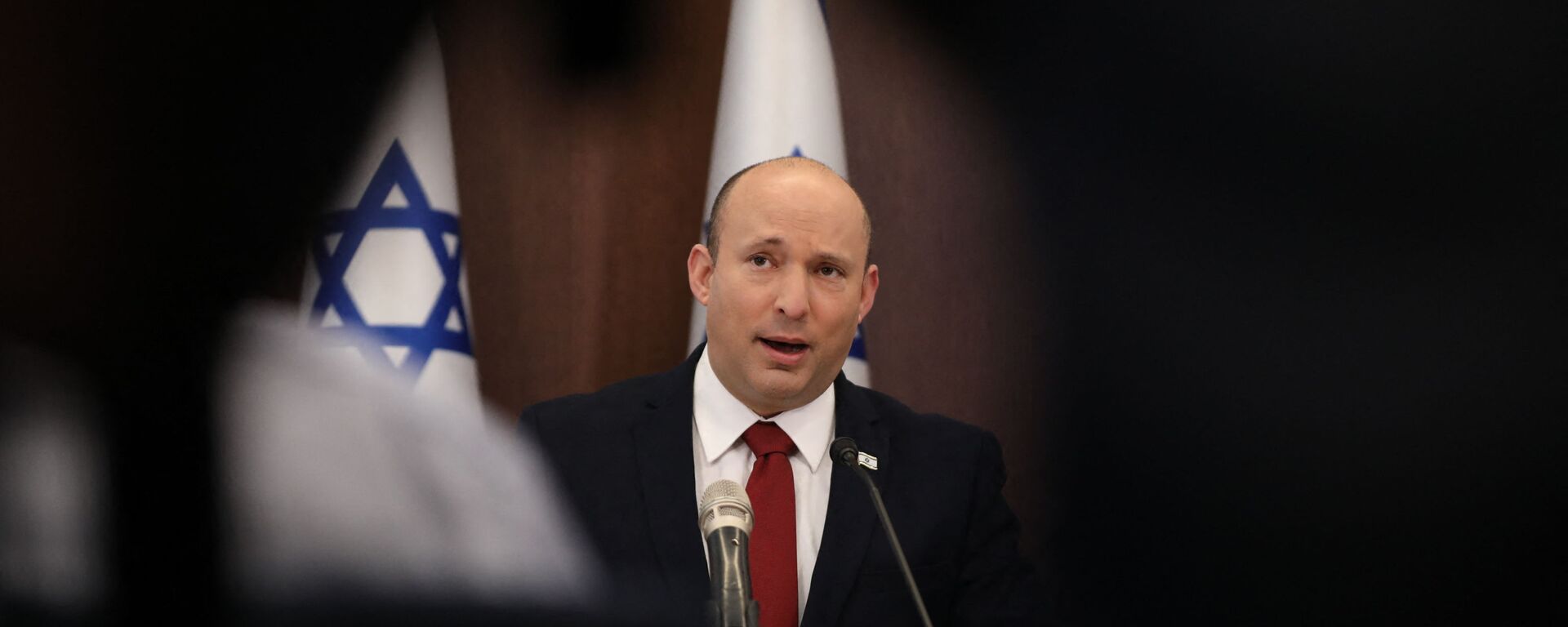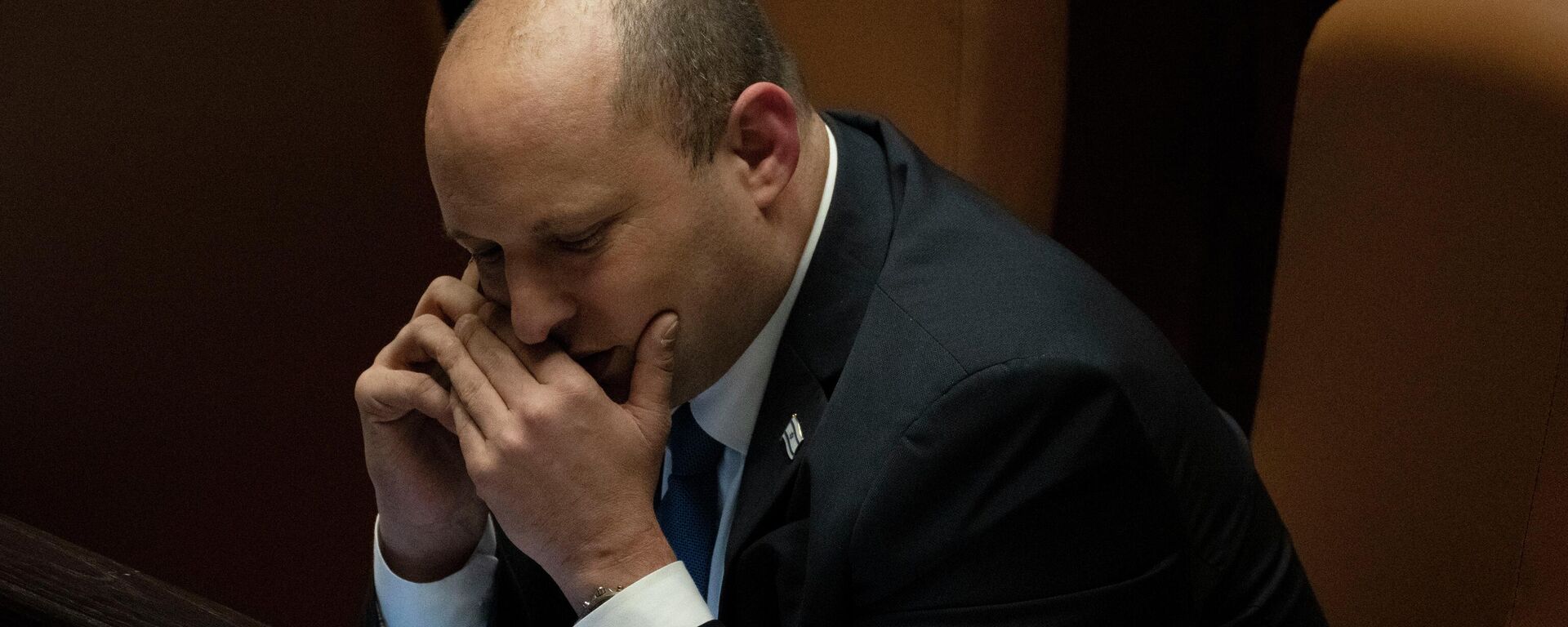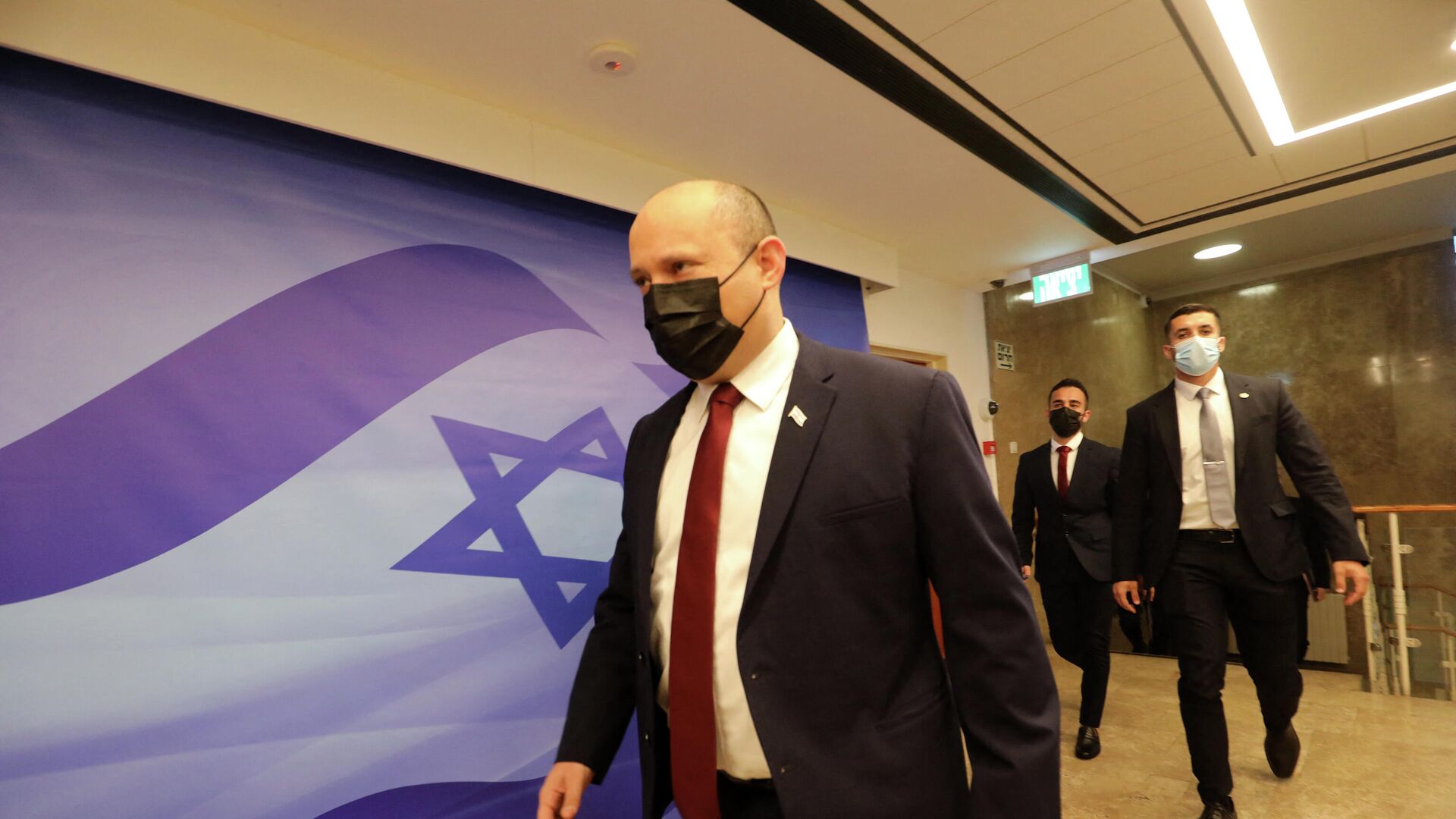https://sputnikglobe.com/20230206/naftali-bennetts-inconvenient-recollection-1107024858.html
Naftali Bennett’s Inconvenient 'Recollection'
Naftali Bennett’s Inconvenient 'Recollection'
Sputnik International
On March 5, 2022, former Israeli Prime Minister Naftali Bennett visited Moscow, where he held a meeting with Russian President Vladimir Putin.
2023-02-06T21:17+0000
2023-02-06T21:17+0000
2023-02-06T21:17+0000
naftali bennett
israel
volodymyr zelensky
vladimir putin
meeting
ukraine crisis
analysis
https://cdn1.img.sputnikglobe.com/img/07e6/01/12/1092336982_0:0:3073:1728_1920x0_80_0_0_0466c8a1add89f89e24b702cb36fd542.jpg
Soon after the meeting, Bennett’s spokesperson told the press the Israeli prime minister made a phone call to Ukrainian President Volodymyr Zelensky.Bennett traveled to Moscow at Zelensky's request to mediate a ceasefire between Russia, which initiated its special military operation on February 24, and the Ukrainian government. According to press reports at the time, Bennett coordinated his efforts with the United States, France, and Germany. Indeed, Bennet had spoken to French President Emmanuel Macron prior to leaving Israel for Moscow, and flew to Berlin after his meeting with Putin to discuss the issues with German Chancellor Olaf Scholz.Bennett’s diplomatic intervention came in the aftermath of two rounds of negotiation between Russia and Ukraine, one on February 28 and a second on March 3, in Gomel, Belarus.According to Bennett, his diplomatic mission succeeded in getting Russia to drop its insistence on the “demilitarization” of the Ukrainian armed forces, while Zelensky pledged Ukraine would never join the North Atlantic Treaty Organization (NATO).But recent disclosures by Bennett suggest there was another purpose to his Moscow visit—to secure a promise from Putin that Russia would not attempt to kill Zelensky.According to Bennett, he then called Zelensky. “‘Listen, I came out of a meeting,’” Bennett claims to have told the Ukrainian president. “‘He’s [Putin] not going to kill you.’ He [Zelensky] asks, ‘Are you sure?’ I said, '100% he won’t kill you.’”According to Bennett, “Two hours later, Zelensky went to his office, and did a selfie in the office, [in which the Ukrainian president said,] ‘I’m not afraid’ and everything.”Indeed, on March 5, Zelensky did in fact publish a video on his Instagram account. “I’m staying in Kiev…on Bankova Street,” Zelensky said, pointing his camera out the window to show the street across from the presidential palace. Zelensky then walked over to his desk to deliver an address in which he asserted that he was “not hiding, and…not afraid of anyone.”The one problem with Bennet’s “recollection” is that it makes no sense. Ukraine and Russia were scheduled for a third round of negotiations, and by all accounts Russia was serious about bringing the conflict to an end. There was no indication that Russia was seeking to target Zelensky or any other Ukrainian leadership elements void of any deliberate provocation on the part of NATO or Ukraine.There was no reason for Bennett to engage in such a conversation with Putin, and there is no reason Putin would need to entertain such a line of questioning.True or not, the timing of this “revelation” could not come at a worse time for the Ukrainian president. With his army being defeated in eastern Ukraine, his government collapsing under the weight of corruption scandals, and promises of military support evaporating from erstwhile NATO allies coming to the realization that they will have to deal with Russia when this war ends, the last thing Zelensky needs is a “recollection” by an Israeli politician that he feared for his life at the very moment that he - the Ukrainian president - was proclaiming his fearlessness before the Ukrainian nation and people.Which, of course, is probably why Bennett chose this moment to release this information to the public. Israel is under tremendous pressure to begin supplying weapons to Ukraine. But Israel must also take care not to allow its relationship with Russia to sour, especially in the field of security (this is especially true given Russia’s existing military posture inside Syria.) Indications are that current Israeli Prime Minister Benjamin Netanyahu will not yield to this pressure, at least for the moment.Bennett’s revelations are designed to embarrass Zelensky, and perhaps encourage his political collapse. Whether Israel acted on its own or, more likely, in close coordination with the US, Germany, and France to begin the process of facilitating Zelensky’s removal from power, it isn’t known. What is known is that Zelensky isn’t long for Bankova Street. And Bennett wants to make sure that is, indeed, the case.
https://sputnikglobe.com/20230206/kremlin-wont-disclose-details-of-putin-bennett-talks-after-ex-israeli-pms-bombshell-interview-1107012769.html
https://sputnikglobe.com/20230205/ex-israeli-pm-reveals-big-concessions-putin-zelensky-were-ready-to-make-before-west-killed-talks-1106993054.html
israel
Sputnik International
feedback@sputniknews.com
+74956456601
MIA „Rossiya Segodnya“
2023
Scott Ritter
https://cdn1.img.sputnikglobe.com/img/07e6/0c/17/1105733958_0:0:334:334_100x100_80_0_0_b457e4e9c850ef224b0cc79059bb38df.jpg
Scott Ritter
https://cdn1.img.sputnikglobe.com/img/07e6/0c/17/1105733958_0:0:334:334_100x100_80_0_0_b457e4e9c850ef224b0cc79059bb38df.jpg
News
en_EN
Sputnik International
feedback@sputniknews.com
+74956456601
MIA „Rossiya Segodnya“
Sputnik International
feedback@sputniknews.com
+74956456601
MIA „Rossiya Segodnya“
Scott Ritter
https://cdn1.img.sputnikglobe.com/img/07e6/0c/17/1105733958_0:0:334:334_100x100_80_0_0_b457e4e9c850ef224b0cc79059bb38df.jpg
naftali bennett, israel, ukraine conflict, vladimir putin, bennett-putin talks, russia-ukraine conflict, russia-ukraine talks sabotaged
naftali bennett, israel, ukraine conflict, vladimir putin, bennett-putin talks, russia-ukraine conflict, russia-ukraine talks sabotaged
Naftali Bennett’s Inconvenient 'Recollection'
On March 5, 2022, former Israeli Prime Minister Naftali Bennett visited Moscow, where he held a meeting with Russian President Vladimir Putin. According to the Kremlin read-out of the meeting, the two leaders “discussed various aspects of the situation in Ukraine in the context of Russia’s special military operation to protect Donbass.”
Soon after the meeting, Bennett’s spokesperson told the press the Israeli prime minister made a phone call to Ukrainian President Volodymyr Zelensky.
Bennett traveled to Moscow at Zelensky's request to mediate a ceasefire between Russia, which initiated its special military operation on February 24, and the Ukrainian government. According to press reports at the time, Bennett coordinated his efforts with the United States, France, and Germany. Indeed, Bennet had spoken to French President Emmanuel Macron prior to leaving Israel for Moscow, and flew to Berlin after his meeting with Putin to discuss the issues with German Chancellor Olaf Scholz.
Bennett’s diplomatic intervention came in the aftermath of two rounds of negotiation between Russia and Ukraine, one on February 28 and a second on March 3, in Gomel, Belarus.
According to Bennett, his diplomatic mission succeeded in getting Russia to drop its insistence on the “demilitarization” of the Ukrainian armed forces, while Zelensky
pledged Ukraine would never join the North Atlantic Treaty Organization (NATO).But recent disclosures by Bennett suggest there was another purpose to his Moscow visit—to secure a promise from Putin that Russia would not attempt to kill Zelensky.

6 February 2023, 11:38 GMT
“I asked, ‘what’s with this? Are you planning to kill Zelensky?''’ Bennett told the press during a recent interview. “He [Putin] said, ‘I won’t kill Zelensky.’ I then said to him, ‘I have to understand that you’re giving me your word that you won’t kill Zelensky.’ He said, ‘I’m not going to kill Zelensky,’” Bennett claims.
According to Bennett, he then called Zelensky. “‘Listen, I came out of a meeting,’” Bennett claims to have told the Ukrainian president. “‘He’s [Putin] not going to kill you.’ He [Zelensky] asks, ‘Are you sure?’ I said, '100% he won’t kill you.’”
According to Bennett, “Two hours later, Zelensky went to his office, and did a selfie in the office, [in which the Ukrainian president said,] ‘I’m not afraid’ and everything.”
Indeed, on March 5, Zelensky did in fact publish a video on his Instagram account. “I’m staying in Kiev…on Bankova Street,” Zelensky said, pointing his camera out the window to show the street across from the presidential palace. Zelensky then walked over to his desk to deliver an address in which he asserted that he was “not hiding, and…not afraid of anyone.”
The one problem with Bennet’s “recollection” is that it
makes no sense.
Ukraine and Russia were scheduled for a third round of negotiations, and by all accounts Russia was serious about bringing the conflict to an end. There was no indication that Russia was seeking to target Zelensky or any other Ukrainian leadership elements void of any deliberate provocation on the part of NATO or Ukraine.
There was no reason for Bennett to engage in such a conversation with Putin, and there is no reason Putin would need to entertain such a line of questioning.
True or not, the timing of this “revelation” could not come at a worse time for the Ukrainian president.

5 February 2023, 17:11 GMT
With his army being defeated in eastern Ukraine, his government collapsing under the weight of corruption scandals, and promises of military support evaporating from erstwhile NATO allies coming to the realization that they will have to deal with Russia when this war ends, the last thing Zelensky needs is a “recollection” by an Israeli politician that he feared for his life at the very moment that he - the Ukrainian president - was proclaiming his fearlessness before the Ukrainian nation and people.
Which, of course, is probably why Bennett chose this moment to release this information to the public. Israel is under tremendous pressure to begin supplying weapons to Ukraine. But Israel must also take care not to allow its relationship with Russia to sour, especially in the field of security (this is especially true given Russia’s existing military posture inside Syria.) Indications are that current Israeli Prime Minister Benjamin Netanyahu will not yield to this pressure, at least for the moment.
Bennett’s revelations are designed to embarrass Zelensky, and perhaps encourage his political collapse.
Whether Israel acted on its own or, more likely, in close coordination with the US, Germany, and France to begin the process of facilitating Zelensky’s removal from power, it isn’t known. What is known is that Zelensky isn’t long for Bankova Street. And Bennett wants to make sure that is, indeed, the case.





